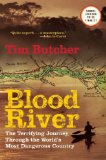Summary | Excerpt | Reviews | Beyond the Book | Readalikes | Genres & Themes | Author Bio

The Terrifying Journey Through the World's Most Dangerous Country
by Tim Butcher
By late afternoon Benoit had given up on making Kabambare by
nightfall, but he was confident we could get out of Katanga. The track continued
across flat ground, but the savannah began to blend with greater numbers of
high-canopy trees. Stanley noted that while Swahili had just one word for
forest, the tribal language of Maniema had four special words - mohuru, mwitu,
mtambani and msitu - for jungle of increasing impenetrability. My backside was
beginning to ache and the hours dragged.
After darkness fell, Benoit started to look for somewhere to
spend the night. After a couple of false leads, he pronounced himself satisfied
with a settlement called Mukumbo. I will never know what Mukumbo looks like
because we arrived there after sunset and left before dawn.
The hut we stayed in had walls of dried mud on wattle, a roof
of heavy thatch and a door panel made of reeds woven across a wooden frame. On
the beaten-earth floor stood a bed - a frame of branches, still in their bark,
lashed together with some sort of vine. The springs of the bed were made of
lengths of split bamboo anchored at only one point halfway along the bed.
The design was ingenious because, when my weight was spread
across the entire structure, the bamboo screen supported it easily, giving and
moving with the contour of my shoulders and hips. It was a Fred Flintstone
orthopedic bed and it was amazingly comfortable.
As I walked to the village latrine I stumbled over something
soft on the ground. I turned on my torch and there, lying on the earth wrapped
in a tattered piece of cotton, was a baby. As the beam of the torch moved I
spotted another child, and another, and then another. The soil was still warm
from the day's sun and the mothers had left their children outside to enjoy the
last traces of heat.
My watch said 3am when I heard Benoit's voice: 'Let's go.' We
were about 100km from Kabambare and needed to travel 200km beyond to reach
Kasongo. I had planned to be able to refill my water bottles with boiled, clean
water overnight, but we had got there too late and left too early. I was sure I
could get clean water in Kasongo, so that meant I had to eke out the remaining
three bottles of water for 300km. Those 100km to Kabambare felt painfully long;
I was aching with hunger. The only food I had with me were energy sweets, given
to me by an old running partner in Johannesburg. 'In case of emergencies,' he
said. He will never know how important they turned out to be.
As I got weaker, Benoit and Odimba carried on as if this was
quite normal. They had drunk and eaten just as little as I, but they coped much
better. The problem was dehydration. In this failing mental half-light,
Kabambare had become the focus of all my faculties. I clung on to the bike,
looking over Odimba's shoulder counting down the 100km. Its sudden appearance
took me by surprise.
Kabambare was a major crossroads of 19th-century exploration:
David Livingstone stayed here for months in early 1871, recovering from a fever
caught on the upper Congo river. The Kabambare I discovered was an eerie place.
For 300km since Kalemie I had seen nothing but grass-roofed mud huts, but here,
at last, were some traces of a more modern world - buildings of cement and
brick. But they were in ruins. All of the sharp edges associated with modern
towns had been eaten away by corrosion.
Benoit drove straight into the overgrown garden of an old
house and parked under a large mango tree. Odimba followed, but when I got off
the bike I struggled to find my land legs. I lurched up against the tree's
trunk, panted loudly and began to lose all peripheral vision.
Benoit could see something was wrong. Behind me I heard
scurrying as he barked orders at someone. 'Bring a chair, bring a chair.' Slowly
I turned round and, instead of just Benoit and Odimba, there was now a 40-strong
crowd of villagers. From within the group a wooden chair - homemade with a
woven-grass seat - appeared. I collapsed into it. It was all a blur and I don't
remember very much apart from stuffing myself on bananas that appeared out of
the crowd, and the moment when the villagers insisted we take a photograph.
From Blood River by Tim Butcher. Copyright Tim Butcher 2007. All rights reserved. No part of this excerpt maybe reproduced without written permission from the publisher, Grove Press.
Dictators ride to and fro on tigers from which they dare not dismount. And the tigers are getting hungry.
Click Here to find out who said this, as well as discovering other famous literary quotes!
Your guide toexceptional books
BookBrowse seeks out and recommends the best in contemporary fiction and nonfiction—books that not only engage and entertain but also deepen our understanding of ourselves and the world around us.